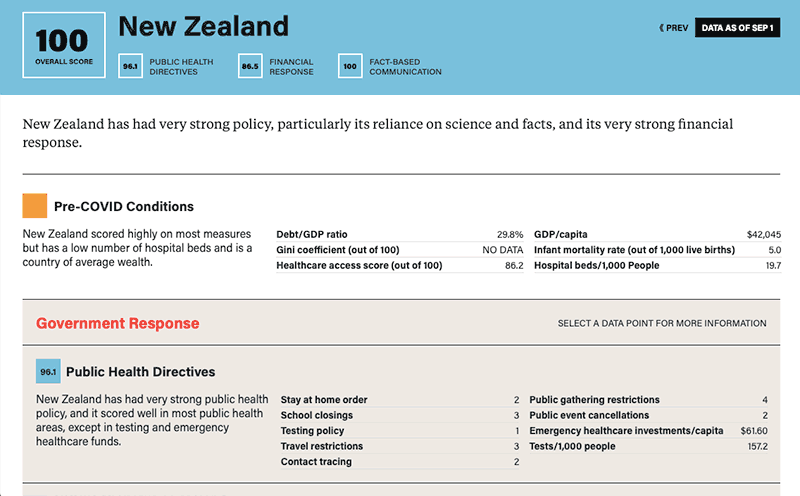A look at how protests, political violence, and conflict have played out during the pandemic.
- 61.5 Public Health
Directives - 20 Financial
Response - 68 Fact-Based
Communication
Mexico's score has deteriorated over time, due primarily to its extremely weak financial response and relatively weak public health policy, including very limited testing.
Pre-COVID Conditions
Low numbers of hospital beds and poor access to quality healthcare resulted in Mexico being poorly prepared for COVID-19.
- Debt/GDP ratio 35.4%
- GDP/capita $21,363
- Gini coefficient (out of 100) 45.4
- Infant mortality rate (out of 1,000 live births) 11
- Healthcare access score (out of 100) 62.6
- Hospital beds/1,000 People 10.2
Government Response
Select a data point for more information(Data points represent policy level as of Jan 1.)
Public Health Directives
Mexico’s relatively strong health policy score was driven down by extremely limited testing.
- Stay at home order 2
- Public gathering restrictions 3
- School closings 3
- Public event cancellations 2
- Testing policy 1
- Emergency healthcare investments/capita $56.93
- Travel restrictions 1
- Tests/1,000 people 25.3
- Contact tracing 1
Financial Response
Mexico had a relatively weak financial response score, with extremely limited stimulus, and little income or debt support.
- Financial stimulus as share of GDP 2%
- Income support 1
- Debt forebearance 2
Fact-Based Communication
President Lopez Obrador has consistently downplayed the threat of COVID-19, accusing the media of exaggeration, encouraging Mexicans not to succumb to fear, and publicly flaunting social distancing recommendations.
- Reliance on science/fact based information 1
- Press freedom 1
COVID-19 Status as of Jan 1
Mexico has a very poor score for country status, as its death rate is high, and its positivity rate is extremely high, meaning it may only be testing the sickest people and missing many positive cases.
- Total deaths 126,507
- Death rate per 100K 981.2
- Total cases 1,437,185
- Cases per 100K 11,147
- Percent of positive tests 43
- Change in positivity rates 0
| Date | Status | New Cases/1M | |
|---|---|---|---|
| 1 | Apr 13 | Those who can't telework are allowed back to work (especially those in construction and manufacturing) | 2.85 |
| 2 | May 18 | 300 municipalities are allowed to start reopening; automotive, construction, and mining sectors reopen | 16.96 |
| 3 | Jun 01 | Restrictions begin easing, based on the situation in each state (green/yellow/orange/red coding) | 24.74 |
Differentiating Factors
- American tourists may be worsening crisis in Mexico: American tourists wary of restrictions at home have increasingly been traveling to Mexico, due to limited border restrictions, but this has played a role in Mexico's rapid rise in COVID-19 cases. Read More
- Mexican officials misled public to avoid lockdown: In early December, the government should have entered a lockdown in Mexico City based on data criteria, but officials used incorrect numbers publicly to justify remaining open for two more weeks, resulting in a much more dangerous situation when they finally did enact restrictions. Read More
- Mexico first Latin American country to begin vaccinations: Amidst a harsh new wave of infections, Mexico began vaccinating healthcare workers in late December using the Pfizer/BioNTech vaccine. Read More
- President Obrador's unwillingness to impose restrictions might explain skyrocketing cases: President Obrador continues to refuse to implement strong restrictions, which, coupled with financial austerity, has played a major role in the skyrocketing case rate and death toll in Mexico. Read More
- Inequality worsens: 45 million people fall below the poverty line, forcing many to resume daily life despite increasing case numbers. Read More
- Borders reopen to Americans: American tourists allowed in to ease economic tensions. Read More
- Key leaders blame COVID-19 cases on soda: Health Undersecretary López-Gatell and Prime Minister Obradar have claimed that soda consumption has driven up comorbidities, resulting in the high number of COVID-19 cases in Mexico. Read More
Compared with Other Western Hemisphere Countries
-
36.2United States 20,184,236
Cases 60,979
Per 1M 347,901
DeathsStill battling widespread COVID-19 cases and deaths, which were exacerbated by the former administration's limited use of facts and science, limited emergency healthcare spending, and limited debt relief, the Biden administration, by contrast, is taking aggressive action to combat the virus, although it may take time for the score to reflect these changes.
-
49.7Brazil 7,700,578
Cases 36,228
Per 1M 195,411
DeathsBrazil has a relatively weak score, primarily due to its poor public health policies, especially its very low levels of testing, coupled with President Bolsonaro’s spreading of misinformation about the virus.
-
59.2Canada 585,400
Cases 15,511
Per 1M 15,644
DeathsCanada has a relatively strong score, with poor public health policy countered by a continued reliance on fact-based communication.
-
85.3Argentina 1,629,594
Cases 36,056
Per 1M 43,319
DeathsArgentina’s strong policy score is mainly due to its strong political response, characterized by clear, fact-based communication and regular press briefings by President Fernandez.
Further Reading From Foreign Policy
Be the source of actionable insight.
Select one of the subscription options below to read the full Covid-19 Global Response Index. Unlock even more global intelligence with a subscription to FP Insider.
Already an FP Insider? Log In
Looking for group access? Contact us directly

Statistics and government response factors available on each country profile include:
Pre-COVID Conditions:
- Debt to GDP ratio
- Infant mortality rates
- Hospital beds per 1,000 people
- Gini coefficients measuring inequality
- Health access and quality
COVID-19 Public Health Directives:
- Stay-at home orders
- School-closing policy
- Public-gathering restrictions
- Cancellation of public events
- Testing policy and rates per 1,000 people
- Emergency healthcare spending per capita
- Travel restrictions
- Contact tracing
COVID-19 Financial Response:
- Stimulus package as a share of GDP
- Income support
- Debt-forbearance
Public Communications:
- Instances of misinformation by leadership
- Limitations on press freedom, censorship
Current/Historic In-Country COVID-19 Status:
- Death rates per 1 million
- Case rates per 1 million





